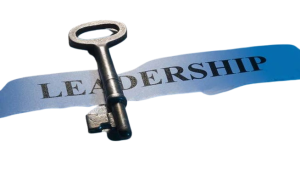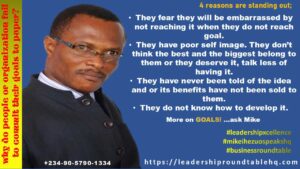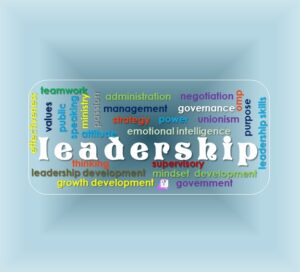
In looking at the Concept of Leadership, I quote Kenneth Boulding in his book, The Image: Knowledge in Life and Society who said, “The meaning of a message is the change that it produces in the image“.
Good leaders are made [put together] not born. If you have the desire and willpower, you can become an effective leader. [??: do you have a desire? What of willpower?] Good leaders develop through a never-ending process of self-study, self-improvement, education, training, and experience.
To inspire your people into higher levels of teamwork, there are certain things leaders or managers must BE, KNOW, and, DO. These do not come naturally but are acquired through continual work and study. Good leaders are continually working and studying to improve their leadership skills; they are NOT resting on their laurels or oars.

Before we go far, let us define leadership.
Leadership is a process by which a person influences others to accomplish an objective and directs the group or organization in a way that makes it more cohesive and coherent. Leaders carry out this process by applying their leadership attributes, such as beliefs, values, ethics, character, knowledge, and skills. Although your position as a manager, supervisor, lead, etc. gives you the authority to accomplish certain tasks and objectives in the organization, this power does not make or confer you a leader…it simply makes you the boss. Leadership differs from boss-ship in that it makes the followers want to achieve high goals, rather than simply bossing people around as we have in boss-ship.
Bass (1989 & 1990) in his “Theory of Leadership” states that there are three basic ways to explain how people become leaders. The first two explain the leadership development for a small number of people. These theories are:
o Some personality traits may lead people naturally into leadership roles. This is the Trait Theory.
o A crisis or important event may cause a person to rise to the occasion, which brings out extraordinary leadership qualities in an ordinary person. This is the Great Events Theory.
o People can choose to become leaders. People can learn leadership skills. This is the Transformational Leadership Theory. It is the most widely accepted theory today and the premise on which many leadership development is based.

Let me come direct:
When a person is deciding if he or she respects, accepts, or regards you as a leader, he or she does not think about your attributes [remember attributes are beliefs, values, ethics, character, knowledge, skills], rather, s/he observes what you do so that he or she can know who you are. He or she uses this observation to tell if you are an honorable and trusted leader or a self-serving person who misuses authority to look good and get promoted. Self-serving leaders are not as effective because their employees or followers only obey them, not follow them. Being obeyed doesn’t make/confer you a leader. It is being followed that does that. They succeed in many areas because they present a good image to their seniors at the expense of their workers.
The basis of good leadership is honorable character and selfless service to your people or organization. In your people’s / employees’ eyes, your leadership is everything you do that affects the organization’s objectives and their well-being.
Respected leaders concentrate on what they are [be] (such as beliefs and character), what they know (such as job, tasks, and human nature), and what they do (such as implementing, motivating, and providing direction). Are you being respected as a leader?
What makes a person want to follow a leader?
People want to be guided by those they respect and who have a clear sense of direction. Who knows where they don’t know and will be willing to take them too there? To gain respect, they must be ethical. A sense of direction is achieved by conveying a strong vision of the future.
The Two Most Important Keys to Effective Leadership
Hay’s study examined over 75 key components of employee satisfaction. They found that:
o Trust and confidence in top leadership were the single most reliable predictors of employee satisfaction in an organization.
o Effective communication by leadership in three critical areas was the key to winning organizational trust and confidence:
- Helping employees understand the company’s overall business strategy.
- Helping employees understand how they contribute to achieving key business objectives.
- Sharing information with employees on both how the company is doing and how an employee’s division is doing – relative to strategic business objectives.
So, in a nutshell — you must be trustworthy and you have to be able to communicate a vision of where the organization needs to go.
Mike Ihezuo has been at the cutting edge of helping leaders and organizations succeed and achieve goals maximally. He can help you and yours profoundly. Kindly reach him at 081-8282-4949, 080-6232-8080, email, or Contact Us.



